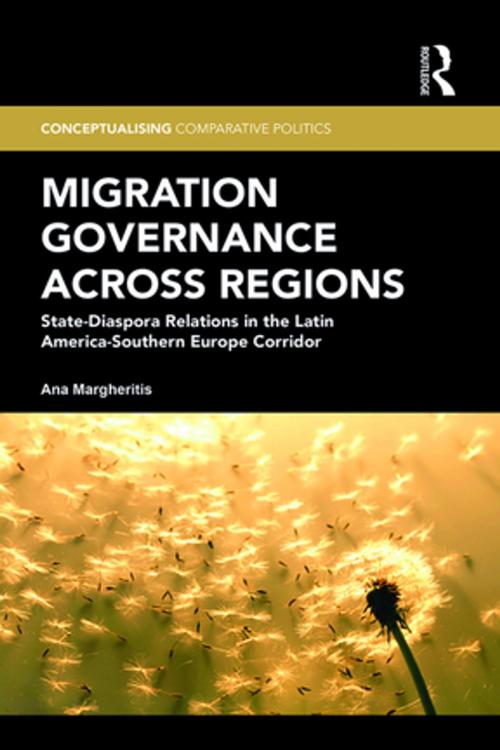Migration Governance across Regions
State-Diaspora Relations in the Latin America-Southern Europe Corridor
Nonfiction, Social & Cultural Studies, Social Science, Cultural Studies, Emigration & Immigration, Political Science, International, International Relations| Author: | Ana Margheritis | ISBN: | 9781317437857 |
| Publisher: | Taylor and Francis | Publication: | December 22, 2015 |
| Imprint: | Routledge | Language: | English |
| Author: | Ana Margheritis |
| ISBN: | 9781317437857 |
| Publisher: | Taylor and Francis |
| Publication: | December 22, 2015 |
| Imprint: | Routledge |
| Language: | English |
Migration policies are rarely effective. Examples of unintended and undesirable outcomes abound. In Latin America, very little is known about the impact and long-term sustainability of state policies towards emigrants. Following a world-wide trend, Ecuador, Uruguay, Mexico, Argentina, and Brazil have developed new institutions and discourses to strengthen links; assist, protect and enfranchise migrants, and capture their resources. As an adaptation of governmental techniques to global realities, these policies redefine the contours of polities, nations, and citizenship, giving place to a new form of transnational governance.
Building upon field research done in these five states and two receiving countries in the last decade, Ana Margheritis explains the timing, motivations, characteristics, and implications of emigration policies implemented by each country, as well as the emergence of a distinctive regional consensus around a post-neoliberal approach to national development and citizenship construction. Margheritis argues that these outreach efforts resemble courting practices. Courting is a deliberate expression of the ambivalent, still incipient, and open-ended relationship between states and diasporas which is not exempt of conflict, detours, and setbacks. For various reasons, state-diaspora relations are not unfolding into stable and fruitful partnerships yet. Thus, she makes "diaspora engagement" problematic and investigates to what extent courting might become engagement in each case.
Studying emigration policies of five Latin American countries and migrant responses in Southern Europe sheds light on the political dynamics and governance mechanisms that transnational migration is generating across regions. It illuminates possible venues to manage multiple engagements of migrants with societies at both ends of their migration journey and unveils the opportunities for states and non-state actors to cooperatively manage of migration flows.
Migration policies are rarely effective. Examples of unintended and undesirable outcomes abound. In Latin America, very little is known about the impact and long-term sustainability of state policies towards emigrants. Following a world-wide trend, Ecuador, Uruguay, Mexico, Argentina, and Brazil have developed new institutions and discourses to strengthen links; assist, protect and enfranchise migrants, and capture their resources. As an adaptation of governmental techniques to global realities, these policies redefine the contours of polities, nations, and citizenship, giving place to a new form of transnational governance.
Building upon field research done in these five states and two receiving countries in the last decade, Ana Margheritis explains the timing, motivations, characteristics, and implications of emigration policies implemented by each country, as well as the emergence of a distinctive regional consensus around a post-neoliberal approach to national development and citizenship construction. Margheritis argues that these outreach efforts resemble courting practices. Courting is a deliberate expression of the ambivalent, still incipient, and open-ended relationship between states and diasporas which is not exempt of conflict, detours, and setbacks. For various reasons, state-diaspora relations are not unfolding into stable and fruitful partnerships yet. Thus, she makes "diaspora engagement" problematic and investigates to what extent courting might become engagement in each case.
Studying emigration policies of five Latin American countries and migrant responses in Southern Europe sheds light on the political dynamics and governance mechanisms that transnational migration is generating across regions. It illuminates possible venues to manage multiple engagements of migrants with societies at both ends of their migration journey and unveils the opportunities for states and non-state actors to cooperatively manage of migration flows.















